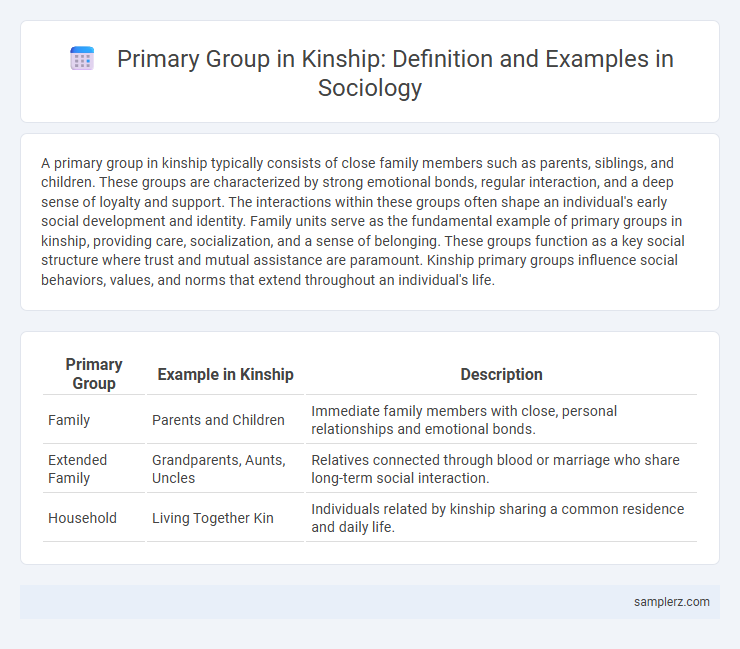A primary group in kinship typically consists of close family members such as parents, siblings, and children. These groups are characterized by strong emotional bonds, regular interaction, and a deep sense of loyalty and support. The interactions within these groups often shape an individual's early social development and identity. Family units serve as the fundamental example of primary groups in kinship, providing care, socialization, and a sense of belonging. These groups function as a key social structure where trust and mutual assistance are paramount. Kinship primary groups influence social behaviors, values, and norms that extend throughout an individual's life.
Table of Comparison
| Primary Group | Example in Kinship | Description |
|---|---|---|
| Family | Parents and Children | Immediate family members with close, personal relationships and emotional bonds. |
| Extended Family | Grandparents, Aunts, Uncles | Relatives connected through blood or marriage who share long-term social interaction. |
| Household | Living Together Kin | Individuals related by kinship sharing a common residence and daily life. |
Defining Primary Groups in Kinship
Primary groups in kinship consist of close-knit, intimate relationships characterized by direct, personal interactions and strong emotional bonds. Examples include immediate family members such as parents, siblings, and children who provide foundational social support and identity formation. These groups play a crucial role in shaping social norms, values, and individual behavior within kinship networks.
Family as a Classic Example of a Primary Group
Family exemplifies a primary group by fostering intimate, enduring relationships through emotional support and direct interaction. Kinship ties within families create a foundation for social identity and belonging, essential for individual development. These close-knit bonds promote trust, cooperation, and shared values, distinguishing primary groups from other social associations.
The Nuclear Family: Parent-Child Bonds
The nuclear family, consisting of parents and their children, represents a primary group characterized by strong emotional bonds and intimate interactions rooted in kinship. Parent-child relationships within this unit are fundamental for socialization, providing essential support, nurturing, and guidance that shape individual identity and social development. These bonds create a stable environment where trust, loyalty, and long-term commitment foster the primary group's cohesion and emotional depth.
Sibling Relationships in Primary Groups
Sibling relationships in primary groups play a crucial role in socialization and emotional support within kinship networks. These relationships foster trust, cooperation, and shared cultural values, influencing individual behavior and group cohesion. Strong sibling bonds contribute to identity formation and provide a foundation for lifelong interpersonal connections in primary social structures.
Extended Family: The Role of Grandparents
Grandparents play a crucial role in the extended family as a primary group, providing emotional support and cultural continuity across generations. Their involvement enhances family cohesion by passing down traditions, values, and history, fostering a strong sense of identity among grandchildren. Research shows that active grandparental engagement contributes to improved social development and well-being in children within kinship networks.
Importance of Kinship in Socialization
Primary groups in kinship, such as immediate family members, play a crucial role in socialization by providing the first context for emotional support and cultural learning. These kinship ties establish foundational norms, values, and behaviors that influence individual identity and social integration. The intimate interactions within kinship groups foster communication skills and the development of trust essential for broader social relationships.
Kinship and Emotional Support Networks
Primary groups in kinship, such as close family members including parents, siblings, and extended relatives, serve as fundamental sources of emotional support and socialization. These groups provide a stable network for nurturing trust, intimacy, and a sense of belonging essential for psychological well-being. Kinship-based emotional support networks significantly influence identity formation and resilience within social structures.
Primary Group Dynamics in Joint Families
Primary group dynamics in joint families revolve around strong emotional bonds, mutual support, and shared responsibilities among kin members. These close-knit relationships facilitate cooperation, socialization, and identity formation within the family unit. Communication patterns and conflict resolution strategies are often deeply rooted in cultural traditions and kinship roles.
Importance of Direct Interaction in Kin Groups
Primary groups in kinship, such as families, are crucial due to the importance of direct interaction among members, which fosters strong emotional bonds and mutual support. These face-to-face interactions enhance trust, cooperation, and socialization, ensuring the transmission of cultural values and norms. The intimate nature of kin groups enables effective communication and collective decision-making, reinforcing social cohesion.
Kinship-Based Primary Groups Across Cultures
Kinship-based primary groups, such as nuclear families in Western societies and extended clans among Indigenous communities, form the core social units that influence identity and support systems. These groups provide emotional bonds, socialization, and economic cooperation, often governed by shared ancestry and cultural norms. Variations in kinship structures across cultures highlight the diverse ways human societies prioritize familial connections and community roles.

example of primary group in kinship Infographic
 samplerz.com
samplerz.com